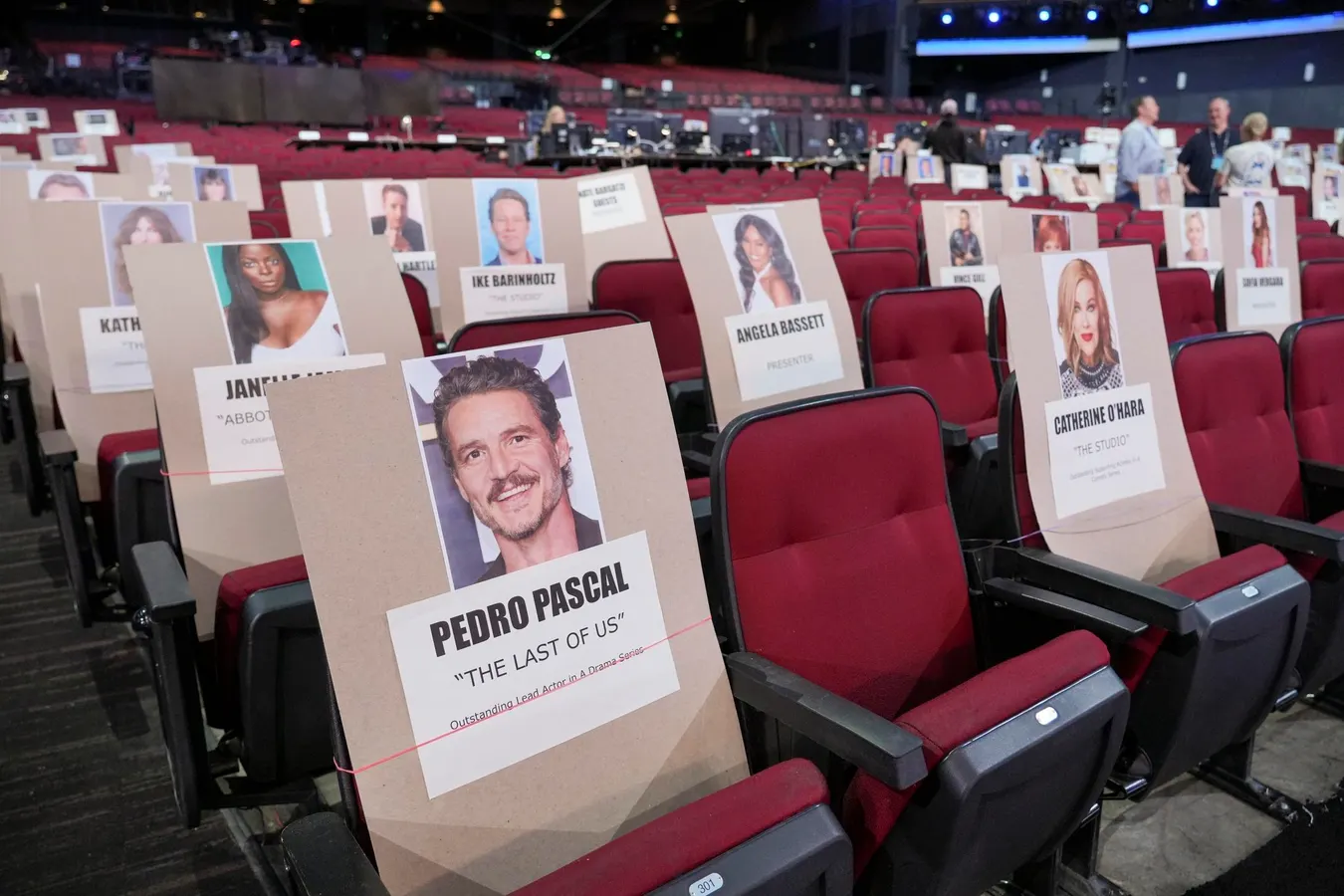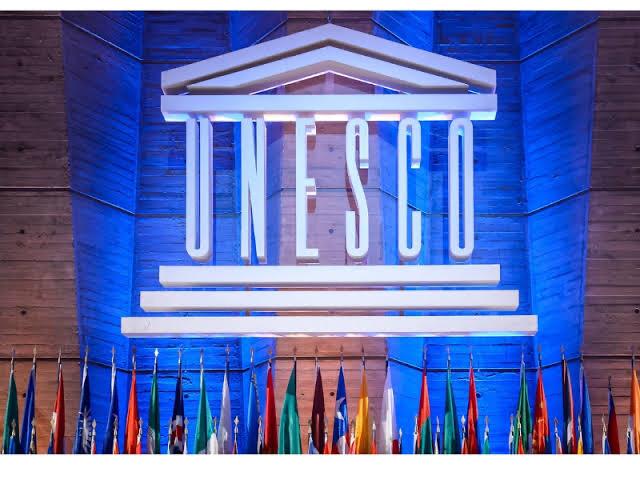
Every September, the Emmy Awards remind us what television can do. They also remind us how much effort goes into polish. The gowns, the cameras, the scripted rhythms of the broadcast all designed to look seamless.
But here’s the question worth asking after the 2025 ceremony: what matters more, the polish or the presence?
Because the moments people will replay over the next few days aren’t the ones with perfect delivery. They’re the ones where polish slips and presence takes over, when someone’s voice shakes, when the guard drops and honesty slips through.
The night even opened with parody: a sketch of a supposed inventor of television, predicting the future only to scoff that the History Channel now shows nothing but aliens. It was an SNL-style cold open, a wink at television’s contradictions, and a reminder that polish in TV has always sat right next to parody of itself.
The Television Difference
The Oscars celebrate film, and film has evolved, but not at the pace of television. Movies are still big events, still consumed in long sittings, still treated as cultural monuments. Television has shifted under our feet.
Streaming platforms have blurred the line between prestige drama and casual binge. YouTube and TikTok clips compete with hour-long episodes. Television is in our pockets now, sliced into fragments, replayed without context.
MORE FOR YOU
On Oscar night, polish feels expected. It’s part of cinema’s tradition of grandeur. But television is different now. Which makes presence even more valuable, because when a raw, authentic moment breaks through at the Emmys, it cuts against an environment where polish is everywhere and presence is rare.
Even host Nate Bargatze leaned into presence. At one point, a running number tied to Boys and Girls Clubs of America flashed on the screen, starting at $100,000. If winners ran over their allotted 45 seconds, the number dropped. Finish early, it went up. A jab at the Emmys’ obsession with timekeeping, but tied to something human.
Image in an Age of Anxiety
It isn’t only Hollywood that obsesses over polish. We all live inside it now. Social media has made sure of that. A photo isn’t just a photo, it’s adjusted, filtered, edited before it’s shared. Even moments meant to feel spontaneous are staged.
The cost shows up most clearly in young people. A Gallup report finds that about three-quarters of Gen Z say they are very happy (25%) or somewhat happy (48%). It also reveals that in addition to about one-quarter of Gen Z who are not happy, about one-quarter of Gen Z do not consistently feel like their life matters, about half often feel anxious, and roughly one in five often feel depressed. Girls in particular report drops in confidence, disrupted sleep, and heavier struggles with mental health. Psychologists call it perfectionistic self-presentation — the need to keep showing a flawless version of yourself to the world. It wears people down. Identity starts to feel like a feed you manage instead of a life you live. Every scroll is another chance to compare yourself against someone else’s fragments.
That’s why an unpolished moment on a stage as big as the Emmys lands harder than expected. A few seconds of unrehearsed honesty can break through the endless flow of gloss.
So what matters most — polish or presence? The question isn’t only for the Emmys. It’s the same one that shows up every time we scroll, compare, and measure ourselves against performances that look perfect.
Owen Cooper, the youngest male winner in Emmy history, gave one of those moments. He spoke haltingly about taking drama classes just three years ago, about never imagining he would be in the U.S., much less on this stage. Back then, he said, he felt like “nothing.” Now he could thank his parents and the people behind the camera. “Step out of your comfort zone a little bit — who cares if you get embarrassed?” he added. It was raw and unscripted, the kind of honesty teenagers will scroll past on their phones tomorrow and know immediately is real.
His show, Adolescence, dominated the night with multiple wins. Its story of coming-of-age awkwardness mirrored what he embodied on stage: the power of being raw, unvarnished, and still finding your footing.
A Line Running Through Emmy History
Presence breaking through polish is not new. Even in earlier decades, the moments that still echo are the ones that felt least rehearsed.
Lucille Ball once lost her glasses on stage at the Emmys and had to fumble her way through. It wasn’t elegant, but it was unforgettable.
Billy Crystal’s homage to Robin Williams in 2014 stopped the room cold. It wasn’t scripted entertainment; it was grief, respect, and memory all at once, presence that didn’t need polish to be felt.
At the 2025 ceremony, Cristin Milioti, accepting for The Penguin, pulled out the back of her therapy notes. Messy, emotional, unpolished. That’s why it hit.
Noah Wyle, winning for The Pitt, opened with words that felt more like presence than performance: “Just having my name included in this list is an honor of a lifetime.” He stood against a category stacked with names like Adam Scott and Pedro Pascal, yet his first instinct wasn’t polish or bravado. It was humility.
Stephen Graham’s win was one of the rawest of the night. As his name was announced, the emotion from his family and friends spilled across the camera. On stage, he spoke with stripped-down honesty: “Any dream is possible.” And to his wife: “You know I would be dead without you.”
Ted Danson and Mary Steenburgen, honored with the Bob Hope Humanitarian Award, spoke about what their parents had taught them about stewardship. It was quiet, heartfelt, and free of showmanship, a reminder that presence isn’t always raw emotion. Sometimes it’s the steady voice of values carried forward.
Presence in a Divided Moment
Polish feels safe in 2025. The country is splintered, and language gets used as ammunition. Public figures have every reason to be careful, to speak in rehearsed lines that offend no one and reveal little.
But safety rarely inspires. Presence does. And presence always carries risk.
Seth Rogen, winning Best Performance in Comedy, admitted he had nothing prepared, that he’d never won anything, didn’t know what to say, and was just happy. Each time he returned to the stage later that night, his speeches got shorter and funnier until they were little more than raw delight. It wasn’t tidy. It was presence, and the room leaned into it.
The night also gave a farewell to The Late Show with Stephen Colbert. As the win was announced, the theater erupted in chants of “Stephen, Stephen.” Colbert recalled Spike Jonze asking him a decade earlier what he wanted the show to be about. His answer: love. “Loss is related to love,” he said, “how much you might love something if you lose it.” It was raw energy, hope, and grit, not polish, but the kind of presence that turns an ending into something unforgettable.
The moment carried extra weight because this wasn’t just a season ending. Colbert’s show has been axed. The chants of his name weren’t only celebration; they were grief and gratitude mixed together, the audience holding on to something already slipping away.
The Other Side of the Contest
Award shows focus on who wins, but every contest has another side. For every person holding the statue, there are four or five who came close and didn’t.
Polite society expects them to smile, clap, look gracious. And they do. Anything else feels ungrateful. But beneath the ritual is something harder to admit: loss stings. And it should. These artists pour years of work and risk into their craft. To be nominated and not to win is not a neutral outcome. It’s a bruise you carry.
That sting doesn’t need to be hidden forever. Maybe not in the broadcast moment, but later, in interviews or conversations, acknowledging disappointment has its own dignity.
Some winners try to soften the edge. Joaquin Phoenix did it at the Oscars in 2020, using his speech not to celebrate his win but to recognize his fellow nominees. He widened the circle instead of standing alone.
John Oliver, up against Colbert, put it bluntly: “I think we all want Colbert to win. I really hope that happens. I’ll be upset if it doesn’t.” Rivalry mixed with admiration, proof the contest carries both edge and heart.
Grace matters. The sting does too. Both tell the truth of what it means to care deeply about the work.
What Presence Is Worth
So what is presence worth right now?
It gives people relief. You see someone stumble a little on stage or lose their place, and it reminds you that you don’t have to be flawless to matter. It draws people closer, because truth has a way of pulling us in that polish never does. And sometimes it lingers — the pause or the crack in the voice that stays in memory long after the rehearsed lines are forgotten.
Cristin Milioti’s therapy notes, Seth Rogen’s rambling delight, Owen Cooper’s halting honesty, all examples of presence that will outlast the highlight reels of gowns and jokes.
For teenagers who will see these Emmy clips over the next few weeks on their phones, that may be the part that matters most. That imperfection doesn’t disqualify you from being admired. That you can still be seen when you’re not performing.
The Emmys remind us of something else too: even in the most performative spaces, presence can slip through. And when it does, people notice.
What Stays
The 2025 Emmys will be written up for the gowns, the jokes, the winners, and the snubs. That’s the polish, and it will fade quickly.
What lingers are the fragments that weren’t rehearsed, a voice breaking, a note pulled from the back of a notebook, a chant that filled the room, a line spoken more to a spouse than to the cameras.
Even the host’s polished bit unraveled. Nate Bargatze’s running total for the Boys & Girls Clubs started at $100,000 and sank embarrassingly into negative territory as winners ran long. He admitted it had flopped: “The number, I’ll be honest, it was embarrassing. I can’t imagine ever doing this again.” And then he turned the stumble into generosity. CBS added $100,000, and he personally gave $250,000, bringing the total to $350,000.
That’s presence: when the script falls apart and something human stumbles in.
So what matters most? Maybe not the polish at all. Maybe it’s presence, the kind that shows up when the lights are too bright and the plan has already failed. The Emmy Awards showed some polish. But a lot of presence too. And maybe that matters more.



